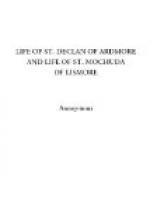19. Now the bell which we have alluded to as sent from heaven to Declan, was, at that time, in the custody of Runan to carry as we have said, for Declan did not wish, on any account, to part with it. On this particular day as they were proceeding towards the ship Runan entrusted it to another member of the company. On reaching the shore however the latter laid the bell on a rock by the shore and forgot it till they were half way across the sea. Then they remembered it and on remembrance they were much distressed. Declan was very sorrowful that the gift sent him by the Lord from heaven should have been forgotten in a place where he never expected to find it again. Thereupon raising his eyes heavenward he prayed to God within his heart and he said to his followers:—“Lay aside your sorrow for it is possible with God who sent that bell in the beginning to send it now again by some marvellous ship.” Very fully and wonderfully and beautifully the creature without reason or understanding obeyed its creator, for the very heavy unwieldy rock floated buoyantly and without deviation, so that in a short time they beheld it in their rear with the bell upon it. And when his people saw this wondrous thing it filled them with love for God and reverence for their master. Declan thereupon addressed them prophetically:—“Permit the bell to precede you and follow it exactly and whatsoever haven it will enter into it is there my city and my bishopric will be whence I shall go to paradise and there my resurrection will be.” Meantime the bell preceded the ship, and it eased down its great speed remaining slightly in advance of the ship, so that it could be seen from and not overtaken by the latter. The bell directed its course to Ireland until it reached a harbour on the south coast, scil.:—in the Decies of Munster, at an island called, at that time, High Sheep Island [Aird na gCcaorac] and the ship made the same port, as Declan declared. The holy man went ashore and gave thanks and praise to God that he had reached the place of his resurrection. Now, in that island depastured the sheep belonging to the wife of the chieftain of Decies and it is thence that it derives its Irish name—Ard-na-Ccaorac, scil.:—there was in it a high hill and it was a promontory beautiful to behold. One of the party, ascending the summit of the hill, said to Declan:—“How can this little height support your people?” Declan replied:—“Do not call it little hill, beloved son, but ’great height’ [ard mor],” and that name has adhered to the city ever since, scil.:—Ardmore-Declain. After this Declan went to the king of the Desii and asked of him the aforesaid island. Whereupon the king gave it to him.




